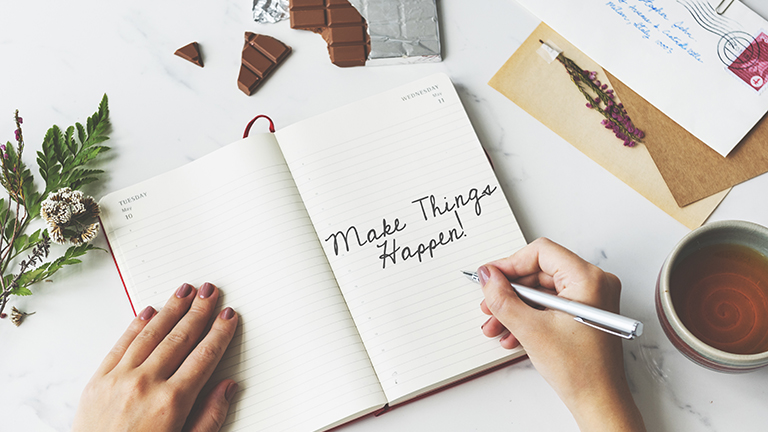Open up your mind with guided journaling prompts for mental clarity. These prompts are designed to help you relieve stress, increase focus, raise self-awareness, and promote mental and emotional balance. These journaling prompts are useful for daily reflections, mindfulness, and personal growth. They also provide a means of organisation that is helpful for processing emotions and achieving mental calm and clarity.
Introduction
Contemporary existence is filled with noise, rapidity, and feeling bombarded. Between constant notifications, and work stress, individuals often struggle with clarity of thought, decision-making, and focus. A relatively simple, yet powerful solution is journaling for mental clarity. Guided writing prompts can assist not only in clarifying thoughts that may be scattered, but also promote mindfulness, reduce anxiety, and increase self-awareness. In this expanded guide, you’ll find 100+ mental clarity journaling prompts, specific advice from leading psychologists, step-by-step strategies on how to build a journaling habit, and concrete suggestions to help you notice the changes, and advantage of journaling as part of your daily routine.
What is Journaling for Mental Clarity?
Using journaling as a practice in restorative practice is an intentional use of prompts and freewriting to make sense of thoughts, self-reflect on feelings, and free up mental space. Journaling is not the same as just taking notes, journaling is mindfulness practice to help with focus, emotional regulation, and refine problem-solving ability.
The Psychology of Writing and Mental Health
Putting thoughts on paper removes them from your mind, which decreases cognitive load and engages certain areas of the brain to evaluate it. Some cognitive behavioural studies suggest journaling helps emotional regulation and can reduce levels of anxiety and depression.
Advantages of Keeping a Journal for Stress, Focus, and Self- Awareness
- Stress Reduction: Off loading stressful thoughts helps reduces cortisol levels.
- Improved Focus & Productivity: Writing releases clutter from your brain and helps you prioritize that which is most important to you and provides an outlet for distraction.
- Emotional Regulation: Journaling is a safe place to express anger, sadness, or fear.
- Increased Self-Awareness: Guided journaling prompts can push deeper into yourself.
How Journaling Improves Mental Clarity
Stress Relief and Emotional Release
When life seems overwhelming you can think of journaling as a release valve. By naming emotions and putting words to them, you reduce their intensity and allow some space for solutions.
Increasing Focus and Productivity
Writing your goals and priorities down every day reduces decision fatigue and re-focuses your mental energy on what really matters.
Improving Self-Reflection and Decision-Making
Journaling fosters metacognition (thinking about your thinking). This process leads to more effective judgment, and a more balanced decision-making process.
The Science Behind Journaling & Mental Health
Research in neuroscience indicates that expressive writing activates the brain’s rational center, the prefrontal cortex, which calms down the over-excitement of the amygdala (the fear center). This leads to feelings of calm. Journaling can furthermore enhance memory consolidation, which allows you to remember valuable lessons and insights.
A study from the University of Texas has linked expressive writing to greater immune functioning, decreased blood pressure, and even healing. Thus journaling is not only a mental health practice but a tool for well-being more broadly.
100+ Journaling Prompts for Mental Clarity
Morning Journal Prompts for Intention
- What are today’s three most important tasks?
- What little thing would make today successful?
- What time or tasks can I eliminate from my day?
- What mindset do I want to carry with me today?
- What distractions do I want to avoid today?
Prompts for Reflecting on the Day
- What am I most grateful for today?
- What challenge did I manage well?
- What took my energy today?
- What did I do that encouraged peace?
- What can I do better tomorrow?
Gratitude and Positivity Prompts
- Write down five reasons that you smiled this past week.
- List three individuals that you appreciate and say why.
- What are some things that you enjoy that you have neglected to appreciate?
- In what ways have you changed over the last year?
- Recall a time when you were very happy, what is a memory you can easily think back to?
Stress and Anxiety Relief Prompts
- What are one or two things I am obsessing about?
- What are some real fears and what are some that are not real?
- What is something I can actively do to get back to a feeling of control?
- If I could only choose to let go of one something negative, what would that be?
- What things do I do that help me cope and to relax when I am starting to stress?
Self-Discovery and Growth Prompts
- What are my principles?
- What beliefs undermine my trust in myself and need to be re-evaluated?
- What habits do I have that will lead me toward my best self?
- What advice would I give a younger version of myself?
- If I could imagine my optimum day, what would it look like?
Decision-Making and Problem-Solving Prompts
- What is the most important choice I am faced with at this moment?
- What are the implications for each possible option?
- Where does my gut lead me?
- What previous decisions did I learn from?
- If fear was out of the equation, what would I do?
Mindfulness and Being Present Prompts
- What are three things I hear, see or feel right now?
- What is one little pleasure I enjoyed today?
- How can I optimise being in the moment in a conversation?
- What triggers me from not being present?
- How do I slow down and enjoy life?
Step-by-Step Guide to Building a Journaling Habit
Step 1: Select Your Medium
Decide whether you’d like to use a notebook or a digital journaling app that feels easy to use and convenient for you on a daily basis.
Step 2: Pick a Time
Being consistent is important. Journaling in the morning will support you in staying focused throughout the day, while journaling in the evening is helpful to reflect on your day and clear your mind before going to sleep. Starting with either time is fine.
Step 3: Keep It Short
Journaling is new, so just write for 5–10 minutes. Once you have gotten use to journaling as a habit, you can increase the length of periods naturally.
Step 4: Use Prompted Journals
Start with a guided journal with prompts to take the pressure off of writing and help you generate insights daily.
Step 5: Review Regularly
Reading through your journal every week or once a month will help you keep track of your growth in patterns and ideas.
Techniques to Make Journaling More Effective
Free Writing
Write freely, without regard for grammar, structure, or spelling. This will release external controls and allow your subconscious to flow.
Bullet Journaling
Organise your goals and tasks, as well as important reflections, in a structured way.
Journaling for Gratitude
Write daily lists of things you are grateful for. This will help shift your mindset and help you think in the present.
Stream-of-consciousness Journaling
Let your thoughts flow freely and capture your feelings as they happen.
Journaling for Prompts
Write with structured prompts (like the ones above) for deeper reflection.
Expert Tips & Opinions
“Journaling isn’t just self-expression—it’s cognitive therapy on paper. Regular practice helps untangle mental clutter, regulate emotions, and foster resilience. In my clinical experience, patients who journal consistently show improved clarity and reduced anxiety.”
Therapists worldwide incorporate journaling in cognitive behavioral therapy, mindfulness-based stress reduction (MBSR), and resilience training. This shows its global relevance across the US, UK, Canada, and beyond.
Frequently Asked Questions (FAQ)
1. How often should I journal for mental clarity?
Journaling every day, even for just 10 minutes, works well. It’s more important to journal consistently than it is to journal for long periods of time.
2. Is it better to journal digitally or by hand?
Both are effective. Handwriting is more powerful for memory retention, while digital journaling offers convenience and faster search capability.
3. Can journaling assist with anxiety and depression?
Yes. Journaling through guided prompts will help release anxious thoughts, decrease your rumination, and increase the chances of positive reappraisal of a situation.
4. When is the best time to journal?
Journaling in the morning can help you maintain focus throughout the day, while journaling in the evening may help you destress and potentially sleep better.
5. How long should I journal each day?
Start with 5-15 minutes of journaling each day. You may find that you will want to increase how long you journal as doing so becomes a habit.
Conclusion Journaling Prompts for Mental Clarity
Journaling is a powerful tool for developing clarity, focus, and emotional resilience. With structured prompts, science-based tools, and consistency, journaling enables practice in your mind to process your thoughts, lessen stress, and facilitate personal growth. No matter if you are in the U.S., the U.K., Canada, or anywhere else around the globe, journaling can be a channel for mental clarity and inner peace for all. Start today with one prompt, and allow the journal to be your lifelong resource for mindfulness and clarity.


